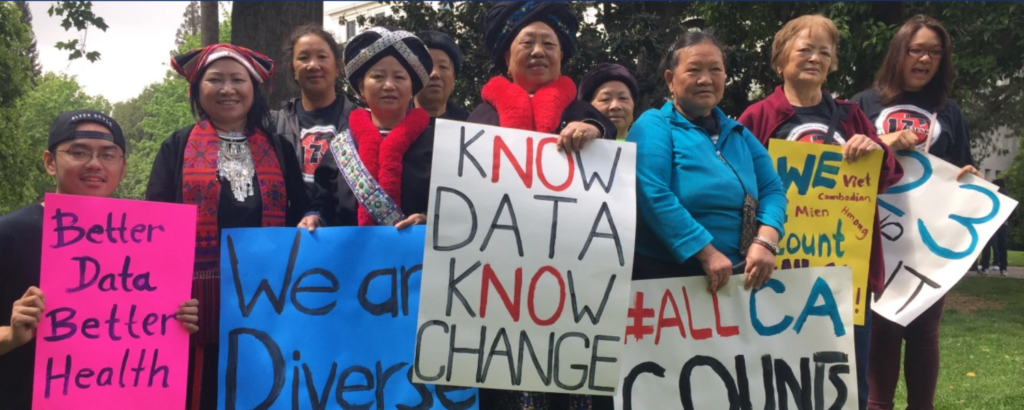March 21, 2024 IN: California, Press Room
SEARAC Policy Brief Highlights Opportunities, Challenges to Achieve Data Equity for AA and NHPI Communities in California
Case study focuses on AB 1726, a landmark data disaggregation law that is now being implemented
SACRAMENTO, CA – SEARAC is proud to release “AB 1726: A California Case Study on Disaggregating Public Health Data by Race and Ethnicity,” a new policy brief that presents key challenges to implementing California Assembly Bill 1726, which passed in 2016 and requires the California Department of Public Health (CDPH) to break down broad demographic data it collects into more specific Asian American, Native Hawaiian, and Pacific Islander (AA and NHPI) subgroups. The policy brief provides recommendations for public agencies on community engagement and data equity practices and is informed by a series of research meetings in which SEARAC participated with stakeholders, including CDPH, local health jurisdictions, health service providers, community organizations, and data advocates.
AB 1726 (CA State Code 8310.7) expanded on decades of work by AA and NHPI advocates for data equity, a powerful tool that uncovers disparities by breaking down and disaggregating broader categories, like “Asian,” into specific ethnic subgroups. Led by SEARAC, Empowering Pacific Islander Communities (EPIC), and other community leaders, AB 1726 requires CDPH to release disaggregated health data for an expanded set of AA and NHPI populations by July 2022. Since then, AB 1726-mandated populations have been included in some birth and death rate releases, and the California Immunization Registry. However, significant implementation challenges remain.
The policy brief cites the desire of stakeholders, including health care providers and local health jurisdictions, for the state to play a more active role in coordinating and standardizing data disaggregation practices. Stakeholders also emphasized the need to better integrate the multiple parties and IT systems that hold health data; detailed race and ethnicity data is often not preserved as it is reported from party to party, or even collected at all.
read the policy brief
“Southeast Asian Americans (SEAAs) experience unique health inequities due to our experiences with war, genocide, and displacement. For example, heart disease and cancer are the leading causes of death for SEAAs in California, potentially linked to toxic chemicals used during the violence in Cambodia, Laos, and Vietnam. Almost half of SEAA Californians are limited English proficient and experience linguistic and cultural barriers to accessing care. Community leaders and policymakers need disaggregated data in order to identify disparities various populations face and create evidence-based solutions that improve health outcomes for all,” said Mandy Diêc, California Deputy Director of SEARAC. “This brief presents ways CDPH should be accountable to underserved communities and work with us to advance the effective health interventions only data disaggregation can catalyze.”
“Data disaggregation is a decades-long advocacy issue that Native Hawaiian and Pacific Islander (NHPI) communities have fought for and will continue to fight for until our communities are thriving. EPIC understands data disaggregation is one of the critical ways to uncover and address NHPI health and social inequities,” said Karla Thomas, Co-Executive Director of EPIC. “AB 1726 would make the health outcomes of additional NHPI ethnic groups including Tongans and Fijians visible. The implementation rollout has been delayed, and the brief examines the challenges local public health agencies have faced since the bill’s 2022 effective date. This case study and recommendations provide advocates and CDPH with clear steps to make sure our data and our communities’ health disparities are no longer invisible.”
read the policy brief
The brief provides a foundation for the start of a new work group convening this month focused on improving race and ethnicity data collection and reporting. The work group is a partnership between CDPH Office of Health Equity and Office of Policy & Planning, academics, and organizations such as SEARAC and EPIC. SEARAC welcomes the dedicated time and attention this work group represents toward ensuring smaller communities invisibilized inside broad racial categories, like “Asian,” have access to health data that reflects their specific needs.
Photo taken from a Sacramento rally in support of AB-1726, including members of the Asian & Pacific Islander American Health Forum, Asian Health Services, Empowering Pacific Islander Communities, Southeast Asia Resource Action Center. Courtesy of SEARAC.





